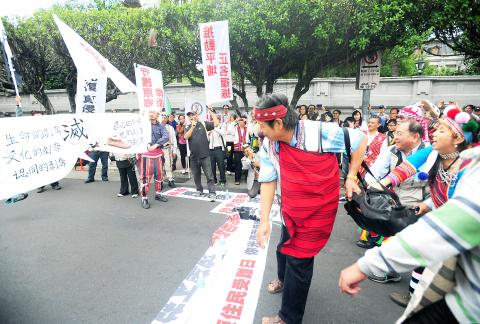|
Retrocession Day marks era of
suffering
By Chris Wang / Staff reporter

A member of the Taiwan First
Nations Party throws a shoe at a sign on Ketagalan Boulevard in Taipei yesterday
to protest the government¡¦s Retrocession Day celebrations. The protesters said
it was a day of suffering for Aborigines in the past.
Photo: Wang Yi-sung, Taipei Times
Far from inspiring respect, Retrocession
Day triggers entirely different feelings among Taiwanese and Aborigines despite
the government¡¦s promotion of the event for more than 60 years, advocates said
yesterday.
The national memorial day in commemoration of Taiwan¡¦s ¡§return to the
motherland¡¨ is a part of Chinese Nationalist Party (KMT) propaganda and a
distortion of history, former Academia Historica president Chang Yen-hsien (±iª¢¾Ë)
said.
¡§Retrocession is a word used by rulers. For Taiwan and the Taiwanese,
retrocession couldn¡¦t be further from the truth, as the KMT authoritarian regime
never cared too much about the people and the island in the past,¡¨ Chang told a
seminar yesterday.
The timing of the seminar, organized by the Wu San-lien Foundation for Taiwan
Historical Materials, was being held on the Retrocession Day to play up the
irony of the KMT¡¦s propaganda, Chang said.
It would be difficult for Taiwanese to appreciate and commemorate a day that
marked the beginning of their suffering and oppression under the then-KMT
regime, which sought to purge Taiwan¡¦s history, culture and language, he said.
The KMT regime¡¦s effort to eliminate Hoklo (commonly known as Taiwanese) was a
perfect example of its oppression of Taiwanese, Li Kang-khioh Taiwanese
Foundation director-general Tan Hong-hui (³¯Â×´f) said.
Japan did not prohibit the use of Hoklo completely until 1937, 42 years after
the beginning of its colonization of Taiwan, while the KMT regime imposed its
Mandarin-only policy immediately after its exile to Taiwan in 1949.
The move, implemented over the past 64 years, had a damaging effect not only on
the Hoklo language, but also on Taiwanese identity, Tan said.
She expressed concern about the survival of Hoklo, saying that despite the
efforts by the former Democratic Progressive Party (DPP) administration to
revive the use of the mother tongue from 2000 to 2008, it ¡§might be too late¡¨ to
reverse the trend as most young people cannot speak Hoklo well and have been
reluctant to speak the language.
¡§To me, the retrocession was Taiwan fall into alien hands,¡¨ she said.
New Taipei City Councilor Icyang Parod agreed.
An Amis who formerly served as head of the Council of Indigenous Affairs in the
DPP administration, Icyang said the day should only be remembered as another
start to the suffering of Aborigines under foreign rule.
The Japanese nationalized almost all Aboriginal lands and the KMT regime
followed suit by maintaining its rights to expropriate Aboriginal territory for
any purpose the regime deemed as ¡§serving the public good,¡¨ he said.
He added that the KMT had ignored a previous policy that tried to return the
lands and autonomous rights to Aborigines after its return to power in 2008.
Up to 45 percent of the 500,000 Aborigines in Taiwan now live in urban areas
because they have trouble making a living in their hometowns after their
traditional territory was taken away, he said.
¡§Oct. 25, 1945 represented prolonged suffering rather than joy for the
Aborigines. To us, that day only meant achange of alien regime,¡¨ he said.
|
![]()
![]()
![]()